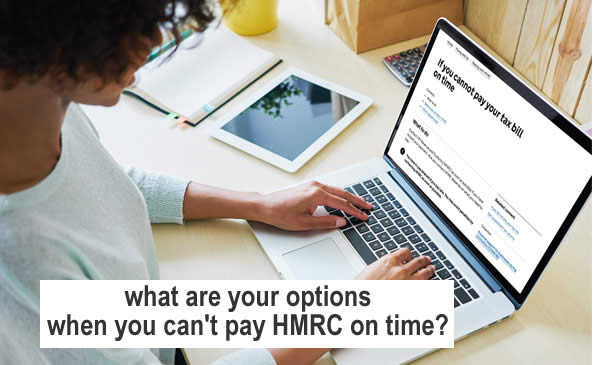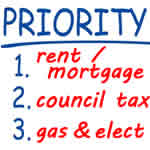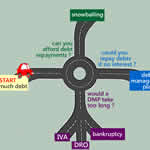
CORONAVIRUS UPDATE
Any self-assessment payments on account due in July 2020 that weren’t paid, will automatically have been deferred until 31 January 2021 without penalty even if you did not ask for this.
The deferred self-assessment payment will then be due at the same time as the normal January self-assessment payment. If you know you won’t be able to pay these, phone the HMRC Self Assessment Payment Helpline.
Contact the HMRC coronavirus (COVID-19) helpline if you cannot pay any other tax bills because of coronavirus.
This is a guest post by Tax Aid, a charity that helps people on a low income with tax problems.
If you can’t afford to pay a tax bill when it is due, you will often want to make a “time to pay” arrangement with the tax man. You may be asked questions that feel very personal, such as what your expenses are – this is because HMRC is more likely to make an arrangement with someone who they feel “can’t pay” rather than “won’t pay”.
HMRC doesn’t behave like other creditors such as banks or credit cards. Here are ten things you need to know about a “time to pay” arrangement:
1. Debt Collection Agencies (DCAs)
Sometimes you may be contacted by a DCA on behalf of HMRC. You can check the agency is genuine by comparing it to the list on the Gov.uk website. DCAs have broadly the same powers as HMRC to agree time to pay over up to 12 months. They will not have any understanding of how the debt has arisen so if you don’t think the amount is correct you should query this with HMRC and not the DCA.
Sometimes HRMC ask DCAs to collect only part of a debt (eg late filing penalties for one particular year) and so the amount being pursued may not be the total amount due. It is important that you are aware if this has happened – you don’t want to offer all your spare income to the DCA if HMRC will still expect to be paid for the rest of the debt.
DCAs are authorised to contact taxpayers by phone and letter; they don’t carry out personal visits. If the DCA fails to reach an agreement with you they will refer the case back to HMRC to consider further enforcement action.
2. Lump sums
HMRC’s Debt Management and Banking Department (DMB) is very unlikely to accept a lump sum of less than the tax due in full settlement.
But if you can offer a lump sum this may help to persuade DMB to accept the rest of the tax over a longer period of time. You should ask HMRC to agree this in writing before paying over the lump sum. Lump sum payments may not be a good idea if bankruptcy is a possibility.
3. Only offer what you can afford
When making a proposal, be careful not to offer more than you can afford. If you fall behind with an agreed schedule of payments, HMRC may end the agreement and start enforcement action against you. If you know in advance that you are likely to miss an instalment, contact HMRC at once and try to negotiate an extension.
4. If your bill is incorrect
If you feel under pressure to pay a bill which you think is incorrect, or one which includes a “determination” (an estimated bill), then you should seek advice. You may need to make a provisional agreement with HMRC to pay some of the tax bill, while the correct amount is worked out or while penalty appeals are being considered for example.
5. Suspension of collection action for a period
HMRC will only consider giving you more than 12 months to pay your tax in exceptional circumstances.
However, DMB may agree to suspend payment demands for a period if you are temporarily unable to pay the tax. This might because you are unemployed or have short-term business problems or are ill. Typically, such an agreement may last for three or six months, with a review of your circumstances at the end of that period. DMB may also agree to give you extra time to settle your bill if you need time to raise funds, for example by selling a property.
6. Reducing payments on account (where tax bill lower than last year)
Often your tax demand will include “payments on account”. These are due on 31 January and 31 July, and are based on the previous year’s tax bill. If you think that your tax bill this year will be lower than the previous year, you can “claim to reduce the payments on account”. This can be done on-line if you are registered for self assessment on-line, or by phoning 0300 200 3310. Alternatively you may download and send in form SA303.
7. Waiver of tax (remission)
Very occasionally HMRC decides not to pursue payment of a tax bill. This is sometimes known as remission. The tax is not permanently written off, but you will not receive further demands unless your circumstances improve unexpectedly. Remission is most common in the case of a person who is elderly, sick or long term unemployed, and has no assets and lives in rented accommodation. If you have a house with equity remission is not likely to be given.
If you think you might be eligible for remission, you can seek advice from TaxAid on how to put your case to DMB.
8. Freezing of interest
HMRC is obliged by law to charge interest and cannot agree to “freeze” interest on the tax in order to help you to clear the debt.
9. If Debt Management & Banking accepts your proposal
If DMB or a DCA appointed by HMRC agrees to your request for time to pay, you should receive confirmation of this in writing. If you get an agreement at a meeting or on the telephone, ask for it to be confirmed in writing. If not, there could be difficulties later if there is a dispute over exactly what was agreed.
Having an agreed payment plan in place will mean that you avoid further late payment penalties.
10. If Debt Management & Banking rejects your proposal
DMB has a duty to consider your proposal, but there is no automatic right to a time to pay arrangement. If you believe that your request has been rejected out of hand, without being properly considered, you can make a complaint and ask for your proposal to be referred to a more senior official and for a full response in writing. HMRC are more likely to refuse requests for a payment plan if it appears that such requests are being made routinely, year after year.
If you fail to get agreement you should still pay what you can, when you can, unless for example it appears that bankruptcy might be inevitable. If you fail to agree a payment plan with DMB then recovery action is likely to be taken. Recovery action may include legally taking control of goods, court action in the Magistrates’ Court or County Court, or Bankruptcy proceedings.
TaxAid Tip: If you have not yet fallen behind with your tax payments, but expect to receive a demand in the near future which you will be unable to pay, contact HMRC’s Business Payment Support Service (BPSS) on 0300 200 3835. The BPSS can agree a payment arrangement in advance, which may be easier than negotiating with DMB after a demand is received. See If you can’t pay your tax bill on time for more information.
Debt Camel says:
If you have other debts as well as owing money to HMRC, you should get help with those. Non-priority creditors such as credit cards may have to accept less, perhaps only token payments, whilst you clear your tax debt. National Debtline, or Business Debtline if you are self employed, can help you look at the full picture.



S says
hi,
Back in 2014 we received notification of over payment of Child Tax Credits from the HMRC to the value of around £9k. I contacted them to advise that the overpayment should not have occured as they were notified of change of circumstances in 2013. The HMRC passed the debt to a DCA, who after discussing our financial situation and the fact i was still under a bankruptcy as well as being in a joint DMP with my wife, they returned the debt back to HMRC as ” no viable means of paying this debt”. Since 2014, i have not heard or received any notification from the HMRC on this debt.
Will this debt automatically be no claimable by the HMRC after a period of time?
Should i wait for them to contact us again on this?
thanks in advance
Sara (Debt Camel) says
The term for a debt which can’t be enforced because it is too old is “statute barred”.
The article above covers tax debts (income tax, VAT etc) – these never become statute barred.
The situation for tax credits overpayments is different – see https://debtcamel.co.uk/statute-barred-debt/.
eddie says
I have a question in relation to the TaxAid Tip: if you *have* fallen behind with tax payments, and expect to receive a demand for payment in the near future that you can’t meet, but have not received such a demand yet (except for bill statements and requests for bill payment in the post), do you still call BPSS, which it says above may be easier than negotiating with DMB after they have made a demand? My position is that I expect to be able to pay, but not immediately; it can be done in tranches over the next 4-5 months. I’d prefer not to get into a formal ‘time to pay’ arrangement with DMB, for a couple of reasons; I’d prefer just to pay the money as I anticipate doing (inevitably the lateness position is already stressful to me) on the basis of an informal understanding or similar.
Any kind of quick answer wd be great!!
Sara (Debt Camel) says
What can I say? TaxAid’s suggestion to arrange a formal Time To Pay agreement is sensible. It isn’t clear that arranging a formal Time To Pay is more stressful than worrying about this.
eddie says
OK. I was asking, obviously, as the TaxAid Tip applies to the scenario where you ‘have not yet fallen behind with payments’ obviously (so I was asking about the same scenario as described, except where you have fallen behind). (There’s a reason for falling behind that will enable me to appeal against penalties for this, btw, I’ve looked into it.)
Nikki says
Hi,
Last year we received a £787 in self assessment penalty charges for overpaid child benefit payments due to the new tax thresholds. Hmrc were most unpleasant and bullish in there approach when we contacted them regarding these penalties. To cut a long story short we had to pay them immediately.
However, having never completed self assessments in our entire working life and not taking any notice of press campaigns that apparently were very visible at the time, we received the letter from hmrc telling us to pay up.
We didn’t think it applied to us as we don’t earn over £50k, hence we took no notice!! However, a bonus does count as earnings. Having never completed self assessments before we didn’t know this. We received no notice from hmrc or notice from our place of work highlighting this and three years later they hunt you down and produce threatening letters. So some stupidity on our part for not being more tax savvy!
However, we seen an article in the press November 2018 saying hmrc were reviewing these penalties and they will contact you if you if a refund is due. I thought I have very little faith in them responding to me and decided to write to them. It’s almost 3 months later but they have removed these charges and admitted a degree of fault on there side.
Anyone in a similar position then I’d definitely send them a letter.
Sara (Debt Camel) says
Thanks for that useful information. It sounds as though it is well worth challenging HMRC if you have penalty charges added for overpaid Child Benefit amounts.
Bobby says
Hi Sara do you know if you have to pay tax on the coronavirus 80% scheme thanks
Sara (Debt Camel) says
I am not a tax expert but if you are employed, then I expect this will paid like normal pay through your employer’s payroll and be taxed in the normal way.
If you are self employed, there is a lot of help on here: https://www.litrg.org.uk/latest-news/news/200402-press-release-litrg-publishes-coronavirus-guidance-tax-and-related-benefits.
Teresa says
My husband owes 13k from self assessment 6 years ago. He’s employed and was paying £200 a month but then HMRC said we needed to pay off and refused a payment plan. We have tried paying lump sums off but still owe 9k our house is in joint names but my husband doesn’t have any assets. What can we do
Sara (Debt Camel) says
HMRC can and do make people bankrupt. I think you need debt advice on your situation. I suggest you talk to National Debtline on 0808 808 4000.
Chance says
I had an accountant setup a limited company for me (sole contractor, required by IR35), who used to act as payroll, but then failed to file any books for three years. Long story short, the hastily filed accounts back filled to stop the fines mounting up show my entire income as a loan, which means I technically owe my “business” everything i required to live on for three years. I spoke to an insolvency practitioner who took £3500 to basically throw me to the wolves with HMRC.
Now, as I don’t have three years income to pay back and I rent my home, I need to work out how best to recover. The IP wants me to sign up for an IVA, which would cause a lot of problems, whilst bankruptcy would end my career and not see me able to pay anything. The limited company has been liquidated. Would I be right in thinking that I should write to HMRC and either resubmit my tax returns to the effect of showing my personal income, negating the corporation tax and asking for the payments already made to be credited to the VaT account and offering to pay the income tax on a payment plan, which is what I had wanted to do, but was advised against prior to liquidation by the “experts”? Should I just accept the inflated figure and offer to pay towards that? Presumably that just means that I’ll be paying it off for years in that case?
Is HMRC likely to prefer something towards the debt than the nothing I can offer if I go bankrupt?
Sara (Debt Camel) says
I’m sorry but you need professional advice from an insolvency practitioner that you trust.
Paul Hector says
In 2019 – I started work with a Canadian company who had UK accountancy firm working for them. Was immediately higher rate tax payer and advised HMRC in writing of the fact on 2019. No problems – was PAYE – COVID happened – still payed normally – then in 2023 Tax office say that the company looking after tax affairs made a mistake in two years – 20-21, 21-22 and I now owe £ 7,700. I have sent letter to accountancy firm asking how they made their mistakes and have told the tax office that as I am on PAYE, this is a problem between Tax office and them …I dont have £ 7.700 and would never be able to pay such a huge bill. Discussions have been going on for 2 years with nothing resolved…I have asked for full evidence from tax office why the wrong employment code as given to me…they have never replied…just saying it was a mistake. Last year they asked a debt collection company to get involved – I explained the whole thing to them and they refused to act on the behalf of HMRC.